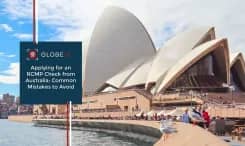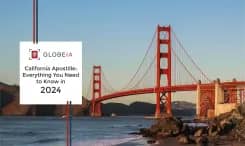State Apostille Services from USA
Apostille Services in California
Apostille Services in Texas
Apostille Services in Florida
Apostille Services in Washington
Services from Canada
Services from United Kingdom
Services from New Zealand

The only Portugal visa guide you will ever need: D1-D7 visa requirements
Every year, a large number of Canadians and Americans decide to relocate to Portugal. They are usually drawn in by the country's rich heritage, its favourable climate, and the high-quality lifestyle that it offers. However, you need to go through the process of getting a visa before you can join your fellow Americans and Canadians in Portugal.
Applying for a Portuguese visa can get pretty confusing, particularly due to the number of visa types to choose from. Since each visa type, starting from D1 and going all the way up to D7, comes with its own unique requirements, we decided to write this blogpost to help you get a clearer picture of your available options. Over the course of this blog, we will cover D1-D7 visa requirements and the types of documents that you will need to present as a Portuguese visa applicant.D1 Visa Requirements
The D1 Visa in Portugal is for professionals with a job offer from an employer in Portugal. The D1 is perfect for Americans and Canadians who want to gain access to the European job market. With a D1 visa, you will not face any restrictions in applying for job posts across the entire European Union.
You will need to fulfill a number of requirements in order to qualify. Some of these are:
- A valid job offer from a Portuguese employer is the first requirement for the D1 visa. The total period of your job offer should also exceed one year of employment. Lastly, your exact role and the terms of employment must also be clearly stated on the job offer letter.
- The next document required is qualifications proof. These qualifications must be relevant to your job. In this section, you can attach your college/university degrees, diplomas, or professional certifications. Proof of relevant work experience may also be required in some cases.
- You will need to provide evidence that you are financially stable to support yourself during your stay in Portugal. Since you are seeking an employment visa, a letter from the Portuguese employer confirming your salary would suffice in this case.
D2 Visa Requirements
This Portuguese visa type is also known as the "Entrepreneur Visa." The D2 visa caters to entrepreneurs and also self-employed professionals who want to establish their businesses in Portugal.
The requirements for this visa are a bit different because of its unique nature. D2 applicants are required to submit:
- A properly outlined and detailed business plan regarding your business plans in Portugal. Globeia’s document verification team recommends including the nature of your business, a professionally written market analysis, and financial projections in your business plan. Lastly, don’t forget to discuss how your business will contribute to the Portuguese economy, as this is critical to your visa application’s acceptance.
- This is similar to the D1 visa requirements, as you will need to provide proof that you will be able to support your stay in Portugal during the entirety of the visa’s duration. The second part of this requirement is showcasing proof of sufficient funds to invest in the business plan that you submitted in the first step.

D3 Visa Requirements
The D3 Visa in Portugal is specifically designed for highly qualified professionals. This includes roles like CEOs, creative directors, researchers, and other specialists in their respective fields.
- Requirements for the D3 visa generally include:
- A valid work contract or job offer from a Portuguese employer, with the scope of the offered role clearly defined.
- As mentioned above, this type of visa is for highly qualified professionals. Therefore, you will need to submit proof of a higher education degree in your field. However, at least five years of proven professional experience in your industry will also be accepted in case you don’t have a degree.
It is also important that your salary documents include a yearly salary that is at least 1.5 times the Portuguese average yearly income. This value is updated yearly, so you will need to check in with Portuguese immigration for the up-to-date number.
Proof of health insurance is also required. Depending on your job offer, you may need to use your own insurance or the health insurance provided by your employer.
D4 Visa Requirements
You can choose the D4 visa if you are a student planning to pursue a degree in Portugal with a duration between 90 days and 12 months.
You must submit:
- Proof of admission to a course at a Portuguese college, university, or any other educational institution.
- You will need to show that you have funds available to cover your degree program’s tuition fees and also your day-to-day living expenses in Portugal. This can be done by attaching bank statements with your application.
- Since this is an education visa, your academic records relevant to your chosen study program in Portugal will also need to be submitted. Most educational institutes in Canada and the U.S. provide their certificates, degrees, and diplomas in English, so a certified translation might not be necessary in this case.
D5 Visa Requirements
American and Canadian students who wish to pursue higher education degrees in Portugal can apply for the D5 visa. This visa will allow you to complete your doctorate or any other higher education program having a duration of up to 4 years. The visa’s validity can also be increased later through a simple application process.
Here is a general list of requirements for this visa:
- An admission letter from your chosen college or university. The letter must come from a recognized Portuguese educational institution, so we’d recommend you do your due diligence while applying for your admission.
- As with any other student visa, you will need to prove, either via bank statements or other sources, that you will be able to [pay for your course fees and other expenses in Portugal. You can also show a guarantor's financial records or your scholarship award proof as well, if available.
- Personal Health insurance coverage, with validity in Portugal, is another requirement.
Lastly, you will need to attach your academic credentials to show the Portuguese immigration officers that you are genuinely trying to immigrate to Portugal for study purposes.
While this is a general list of requirements that you are going to have to submit with your D5 visa form, there might be additional documentation required. This varies depending on the degree program, duration of stay, and also your selected institute in Portugal.
D6 Visa Requirements
The D6 Visa is intended for family reunification in Portugal. It allows family members of Portuguese citizens and residents to join them in the country, from any other region in the world.
If you’re looking to relocate to Portugal to be with your family, here’s what you can expect to provide alongside your application:
- A proof of your relationship with a family member in Portugal who is a citizen or permanent resident. To fulfill this requirement, you can use birth certificates, marriage certificates, and similar documents as proof.
You will also need to prove that your family member in Portugal can financially support your stay with them. Bank statements from a Portuguese bank would suffice in this case.
The Globeia team understands that you might be coming from a country where English or Portuguese are not the official languages. In such cases, you will need to obtain a certified translation of your documents (birth certificate, marriage certificate, and similar). These copies can be obtained by using the services of a well-reviewed company like Globeia.
D7 Visa Requirements
The D7 Visa is a Passive Income Visa for international applicants who have regular income from passive sources. This includes sources other than fixed employment. Examples include capital investments, monthly/yearly pensions, and income from rental properties.
The requirements for this visa are:
Proof of stable passive income. This income must be sufficient to support your lifestyle in Portugal after your visa’s approval. The exact amount may vary, but it is always higher than the Portuguese minimum wage.
We have focused primarily on the unique requirements for each visa type, from D1 to D7. Basic requirements, such as health checkup certificate, criminal record clearance certificate, and valid passport apply to all of these visas that we have discussed over the course of this article. The Globeia team would recommend you to always double-check the latest list of requirements, as updated by the Portuguese immigration department on their website and other communication channels.









Global Services
State Services